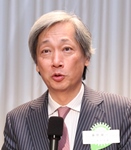From a Free World to Power Competition
November 12, 2014
Mr. Kiichi Fujiwara
Professor of Law, University of Tokyo
�� When the Cold War came to an end, it was believed that a free world based on capitalism and democracy would prevail to bring stability, especially to the West. I must say we live in quite a different world today, after going through the wars in Afghanistan and Iraq as well as the global financial crisis triggered by the collapse of Lehman Brothers which were major turning points of our time.
When the Cold War came to an end, it was believed that a free world based on capitalism and democracy would prevail to bring stability, especially to the West. I must say we live in quite a different world today, after going through the wars in Afghanistan and Iraq as well as the global financial crisis triggered by the collapse of Lehman Brothers which were major turning points of our time.
��China and Russia are gaining power to become destabilizing factors. Russia confronts against the West over the crises in Georgia and Ukraine. China has come to take a tough stand from around 2009, demanding for its power to be��acknowledged.
��Western countries had provided various assistance and military intervention to stabilize the politically insecure developing countries, believing such actions would not undermine their own national security. However, the 9.11 terrorist attacks changed the whole picture. What is more, interventions in Afghanistan and Iraq brought nothing but instability and a power vacuum to these areas.
��Against this backdrop, the Obama Administration made a drastic policy change towards military pullouts. Consequently, Afghanistan and Iraq are plagued with prolonged instability while the authorities came to collapse in Iraq and Syria.
��China and Russia base their policies on the assumption that US will not engage in warfare. Now, the Obama Administration is moderately shifting back to an intervention policy, shown in its tough military operations against the Islamic State of Iraq and Syria (ISIS). I am much concerned because the Obama Administration seems to follow in the footsteps of the Carter Administration after the Vietnam War which instigated military interventions by Russia in Angola, Mozambique and Afghanistan, the Iran hostage crisis and eventually discredited the Administration's credibility and power that led to a landslide victory for President Reagan. The recent Midterm Election in the US brought a crushing defeat to President Obama's Democratic Party. The split Congress will surely make the Administration become inward-looking and have a harder time moving their agenda.
��Talking about the Middle East and North Africa, the biggest problem is the rapid increase of the so-called ��failed states〞where the governments have lost control of their territory. They are namely Iraq, Syria, Yemen, Libya, Mali, Sudan, South Sudan and Congo. Governments in these areas had limited power to begin with but the striking feature is that major movement towards democratization, sparked by the resignation of President Mubarak in Egypt, has resulted in state collapse. Libya turned into a failed state after the NATO military intervention to implement the UN Security Council Resolution to end the attacks by Muammar Gaddafi's regime against its unarmed civilians. No military intervention had been made in Syria until quite recently that resulted in over one-third of its population becoming internally-displaced. It is estimated that 500,000 to 700,000 refugees have crossed the border into Turkey and even more refugees entered Jordan. The Obama Administration finally launched air raids in Iraq and Syria. I must say US military operations have made some achievements in the northern part of Iraq and the Turkey-Syria border, while they have produced no results from across central Iraq to central Syria. This is because there is no legitimate governance structure in these areas. Both cases have proved that if you impose military oppression to unarmed pro-democracy movements, they will exacerbate to civil wars that give militia groups room to take power.
��If we turn to Russia, I must say this country poses a greater threat than China to the present world in the short run. It is because Russia is feeling a mounting sense of frustration, after losing the Cold War that dissolved the Soviet Union and enabled many republics to gain independence and even to take opposing policies. President Putin, especially in his second term of Presidency, is implementing bold measures to leverage natural resources to exert influence on international society. Support and popularity of the Putin Administration are rooted in nationalism, reflected in the opinion poll results. While Putin's approval rating had hovered at a low level before the crisis in Ukraine, it hiked to reach almost 80% after Russia annexed Crimea from Ukraine. The current Russian regime remains a greater threat than China because it strives to rise from the losing side up to the winning side.
��China has come to acquire greater economic and military power. China focuses on the continuing dominance by the Communist Party as well as maintaining domestic security and order as we live through the time of confusion, quite different from the free world envisioned right after the Cold War.
��In the current world, we witness the shift from power concentration to power disintegration and superiority of a free world taken over by military competition among major powers. I must say international organizations have lost the momentum and we cannot expect much from the permanent members of the UN Security Council as they might get engaged as enemies. We should be concerned about the risk of small-scale conflicts conflating into major wars, seen in the case of World War I. Such situations will give countries without military dominance to prevail and will further aggravate wars to counter the threat posed by such countries.